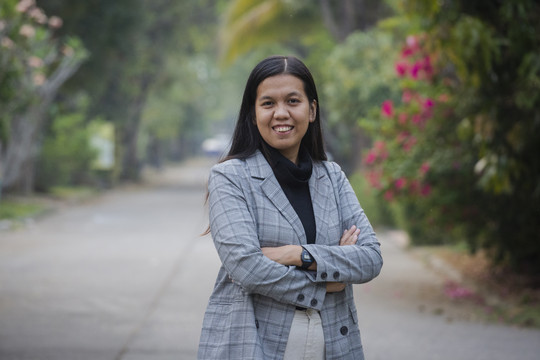You had been reporting from Myanmar before the coup and you were also arrested before the takeover by the military in 2020 while investigating a multibillion-dollar Chinese investment. How has this arrest changed your way of doing journalism and reporting on sensitive topics?
After I was arrested on the Thai border and released, my parents asked me to stop working as a journalist. At that time, I promised my parents that I would not cover such dangerous cases again. And I said that I would not take the risk of being arrested again. My parents were worried about me and wanted me to quit my job. Later, I continued reporting on the Shwekkol project and the businesses related to the Border guard force. My arrest motivated me to find out more about these matters. I thought that pursuing my reporting was more important than stopping work because I had been arrested. At work, I became much more careful than I used to. I was very cautious about security issues while I continued my investigations. My arrest set a good example for my news agency and my journalist colleagues to be extra careful about security when reporting. Currently, I am still writing investigative reports from Chiang Mai, Thailand. Sometimes I travel to border cities and do ground reporting.
The crackdown on freedom of media and expression is still ongoing in Myanmar. The military is revoking licences and outlawing independent outlets, which has made it hard for many journalists to find paid work. How has it affected women journalists more specifically?
After the military coup, the military council severely attacked the media sector. Journalists were also unjustly arrested, and among the arrested journalists were many female journalists. Women journalists who were arrested are facing physical abuse, illegal lawsuits, as well as psychological harm. Arrested journalists are being treated for physical and psychological injuries, and journalists like us who have not yet been arrested are still dealing with a lot of trauma caused by the military council. Journalists have witnessed the violent beatings, arrests, shootings and killings of protesters right in front of their eyes.
You have said many times that despite the repression and danger of being a journalist in Myanmar, you would not stop. How do you practice journalism and ensure your safety at the same time?
As a journalist in Myanmar, you have almost no guarantee of safety. Before the military coup, journalists' lives were insecure. I was arrested before the military took power, and there are many other journalists who were arrested before the military took power. However, since I became a journalist in Myanmar, I have realised that it is a dangerous job, and it is best to be prepared and cautious when receiving any kind of news. It is still possible to be arrested, so it is best to take safety precautions when working. After the coup d'état, the situation got worse. In the past, it was dangerous to cover the news, but after the military coup, being a journalist became very dangerous, and it has led to a situation where you can be arrested any time. Even before I left Myanmar, I had to keep my profession as a journalist secret, and when my parents were asked about me, they often said that I had stopped working as a journalist a long time ago.
Would you have any safety tips to share with other women journalists reporting from conflict zones?
When reporting in conflict zones, it is important to understand the situation on the ground and to blend in with those on the ground. You should also find friends nearby who can help you when you have a problem, and be careful to keep in touch with your news sources and an editor or a colleague at your news agency. You should also decide on a code with your news agency, and carefully work on a plan B in advance in case of emergency .
Why do you think women's involvement in the coverage of war is important?
If there is a war, it is not only men who have to participate. Women too. In the current revolution in Myanmar, the role of women is also very important. Female soldiers, female medics, female journalists, female activists and other women are also supporting the great revolution. Due to the capacity and participation of women, the revolutionary process of Myanmar has been able to move forward quite effectively. Among those who are working as Union ministers appointed by the National Unity Government, there are still many women ministers. This shows that women are involved in the revolution and their participation has an impact.
What are Burmese women journalists' most pressing needs right now?
The most pressing needs are job opportunities. When female journalists are arrested and released, it is difficult for them to continue their work as journalists. Female journalists who have illegally entered the border and are fleeing are also facing financial difficulties as they cannot find work easily. So, the second thing they need is financial support. Here, I am referring to women journalists who find it difficult to find jobs and are unemployed.
Any message you would like to convey to women journalists around the world on 8 march?
Female journalists who sacrificed themselves to report during Myanmar's revolutionary process have proven that female journalists can work equal to male journalists. As women, we can continue to empower women by doing the best we can from where we are and showing that our actions are having a positive impact.

